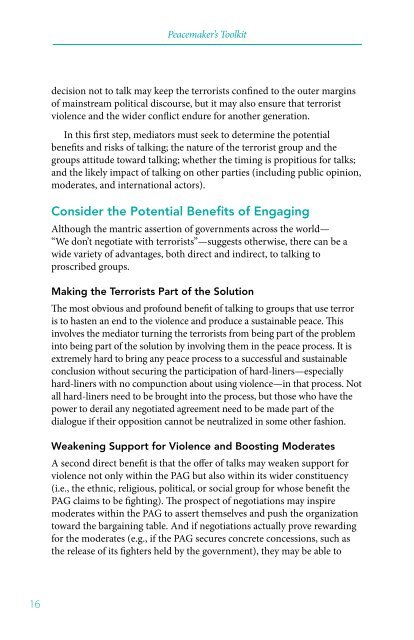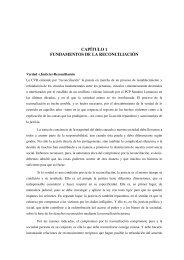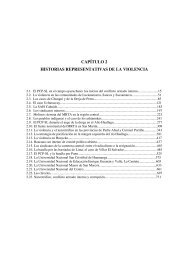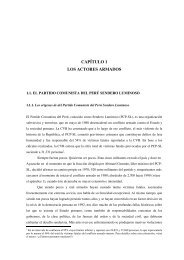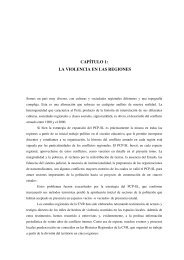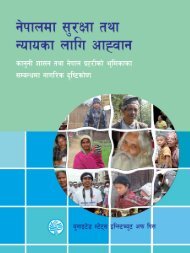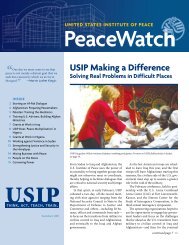Talking to Groups that Use Terror.pdf - United States Institute of Peace
Talking to Groups that Use Terror.pdf - United States Institute of Peace
Talking to Groups that Use Terror.pdf - United States Institute of Peace
You also want an ePaper? Increase the reach of your titles
YUMPU automatically turns print PDFs into web optimized ePapers that Google loves.
<strong>Peace</strong>maker’s Toolkitdecision not <strong>to</strong> talk may keep the terrorists confined <strong>to</strong> the outer margins<strong>of</strong> mainstream political discourse, but it may also ensure <strong>that</strong> terroristviolence and the wider conflict endure for another generation.In this first step, media<strong>to</strong>rs must seek <strong>to</strong> determine the potentialbenefits and risks <strong>of</strong> talking; the nature <strong>of</strong> the terrorist group and thegroups attitude <strong>to</strong>ward talking; whether the timing is propitious for talks;and the likely impact <strong>of</strong> talking on other parties (including public opinion,moderates, and international ac<strong>to</strong>rs).Consider the Potential Benefits <strong>of</strong> EngagingAlthough the mantric assertion <strong>of</strong> governments across the world—“We don’t negotiate with terrorists”—suggests otherwise, there can be awide variety <strong>of</strong> advantages, both direct and indirect, <strong>to</strong> talking <strong>to</strong>proscribed groups.Making the <strong>Terror</strong>ists Part <strong>of</strong> the SolutionThe most obvious and pr<strong>of</strong>ound benefit <strong>of</strong> talking <strong>to</strong> groups <strong>that</strong> use terroris <strong>to</strong> hasten an end <strong>to</strong> the violence and produce a sustainable peace. Thisinvolves the media<strong>to</strong>r turning the terrorists from being part <strong>of</strong> the problemin<strong>to</strong> being part <strong>of</strong> the solution by involving them in the peace process. It isextremely hard <strong>to</strong> bring any peace process <strong>to</strong> a successful and sustainableconclusion without securing the participation <strong>of</strong> hard-liners—especiallyhard-liners with no compunction about using violence—in <strong>that</strong> process. Notall hard-liners need <strong>to</strong> be brought in<strong>to</strong> the process, but those who have thepower <strong>to</strong> derail any negotiated agreement need <strong>to</strong> be made part <strong>of</strong> thedialogue if their opposition cannot be neutralized in some other fashion.Weakening Support for Violence and Boosting ModeratesA second direct benefit is <strong>that</strong> the <strong>of</strong>fer <strong>of</strong> talks may weaken support forviolence not only within the PAG but also within its wider constituency(i.e., the ethnic, religious, political, or social group for whose benefit thePAG claims <strong>to</strong> be fighting). The prospect <strong>of</strong> negotiations may inspiremoderates within the PAG <strong>to</strong> assert themselves and push the organization<strong>to</strong>ward the bargaining table. And if negotiations actually prove rewardingfor the moderates (e.g., if the PAG secures concrete concessions, such asthe release <strong>of</strong> its fighters held by the government), they may be able <strong>to</strong>16


